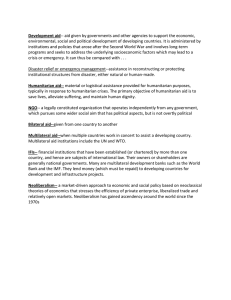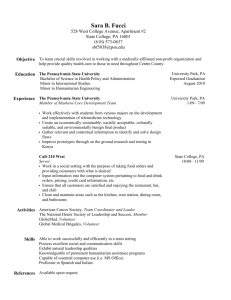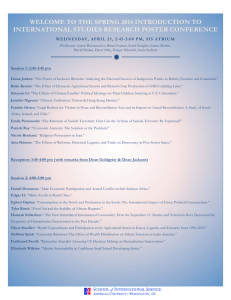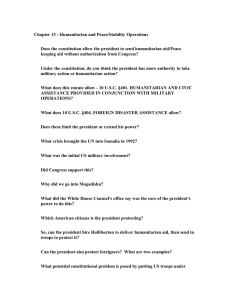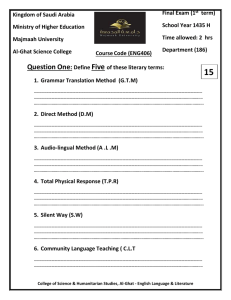An Open Letter from High Commissioner for Human Rights, Ra’ad... Member States of the United Nations
advertisement
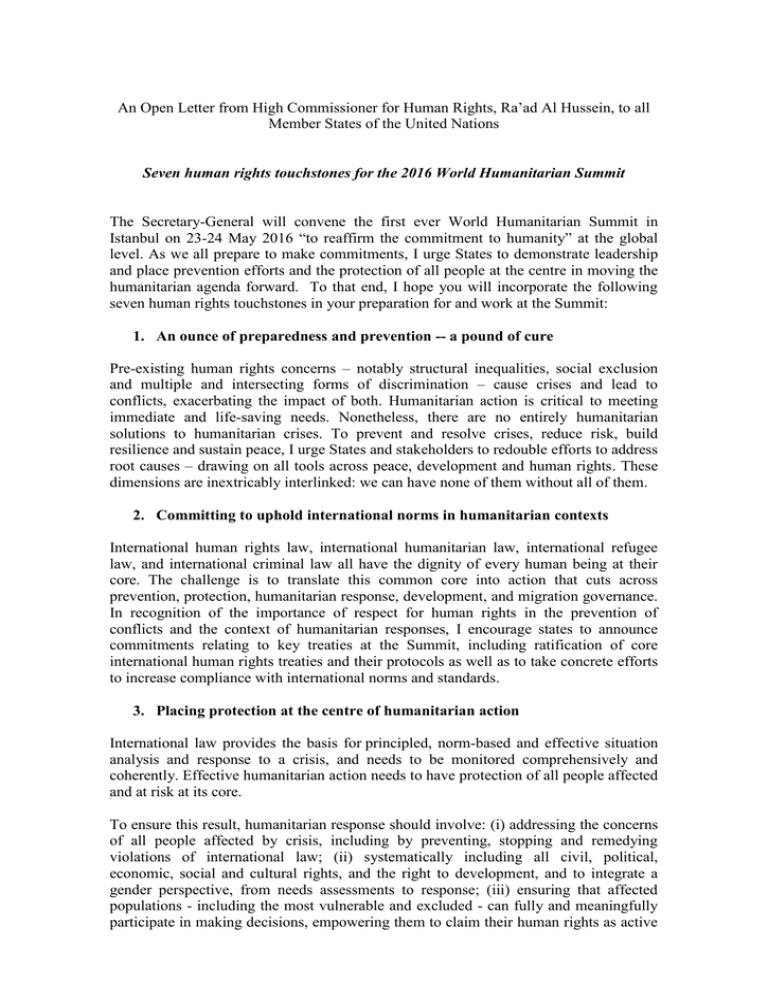
An Open Letter from High Commissioner for Human Rights, Ra’ad Al Hussein, to all Member States of the United Nations Seven human rights touchstones for the 2016 World Humanitarian Summit The Secretary-General will convene the first ever World Humanitarian Summit in Istanbul on 23-24 May 2016 “to reaffirm the commitment to humanity” at the global level. As we all prepare to make commitments, I urge States to demonstrate leadership and place prevention efforts and the protection of all people at the centre in moving the humanitarian agenda forward. To that end, I hope you will incorporate the following seven human rights touchstones in your preparation for and work at the Summit: 1. An ounce of preparedness and prevention -- a pound of cure Pre-existing human rights concerns – notably structural inequalities, social exclusion and multiple and intersecting forms of discrimination – cause crises and lead to conflicts, exacerbating the impact of both. Humanitarian action is critical to meeting immediate and life-saving needs. Nonetheless, there are no entirely humanitarian solutions to humanitarian crises. To prevent and resolve crises, reduce risk, build resilience and sustain peace, I urge States and stakeholders to redouble efforts to address root causes – drawing on all tools across peace, development and human rights. These dimensions are inextricably interlinked: we can have none of them without all of them. 2. Committing to uphold international norms in humanitarian contexts International human rights law, international humanitarian law, international refugee law, and international criminal law all have the dignity of every human being at their core. The challenge is to translate this common core into action that cuts across prevention, protection, humanitarian response, development, and migration governance. In recognition of the importance of respect for human rights in the prevention of conflicts and the context of humanitarian responses, I encourage states to announce commitments relating to key treaties at the Summit, including ratification of core international human rights treaties and their protocols as well as to take concrete efforts to increase compliance with international norms and standards. 3. Placing protection at the centre of humanitarian action International law provides the basis for principled, norm-based and effective situation analysis and response to a crisis, and needs to be monitored comprehensively and coherently. Effective humanitarian action needs to have protection of all people affected and at risk at its core. To ensure this result, humanitarian response should involve: (i) addressing the concerns of all people affected by crisis, including by preventing, stopping and remedying violations of international law; (ii) systematically including all civil, political, economic, social and cultural rights, and the right to development, and to integrate a gender perspective, from needs assessments to response; (iii) ensuring that affected populations - including the most vulnerable and excluded - can fully and meaningfully participate in making decisions, empowering them to claim their human rights as active agents and rights-holders - not as passive beneficiaries of ‘charity’; (iv) ensuring accountability, access to justice and right to an effective remedy; and (v) ensuring that humanitarian action in itself complies with human rights standards, for example by distributing services and goods of adequate quality without discrimination. 4. Leaving no one behind The security, voice, visibility and participation of persons in situations of vulnerability or exclusion must be enhanced by combating inequality, discrimination and exclusion in the design and implementation of humanitarian preparedness and responses. This must apply across all affected populations, including children, youth, minorities, indigenous peoples, migrants, internally displaced persons, refugees, stateless persons, lesbian, gay, bisexual, trans and intersex persons, persons with disabilities, those living with HIV/AIDS, older persons, and in particular women and girls in all these categories. All efforts to ensure that no one is left behind, as called for by the 2030 Sustainable Development Agenda, should be organised around a human rights-based approach. For example, migrants are among the people most at risk. According to international law, States must protect the human rights of all migrants, regardless of their status, without discrimination, including ensuring that migrants in vulnerable situations are integrated in humanitarian action. Equally, protecting the human rights of internally displaced persons, including the millions displaced by conflict, ensures their dignity and offers them hope for the future in their countries of origin. As another example, we must develop global standards, guidelines and coordination arrangements for persons with disabilities in humanitarian action, ensuring their inclusion both as targets and agents of humanitarian response. Persons with disabilities must have access, both physically and in communication, to decision-making, including regarding the "building back better" efforts in the recovery phase. 5. Advancing substantive gender equality in humanitarian action The differential experiences of humanitarian crisis on women, men, girls and boys deserve more attention. Gender–based marginalization, exclusion, violence and discrimination can lead to humanitarian crises having a disproportionate impact on women and girls. Crises may however also represent an opportunity to challenge and correct existing power imbalances. Humanitarian responses must fully support the women’s and girls’ fundamental role in building resilient and peaceful societies, as part of organized civil society, as human rights defenders, as active agents in both formal and informal peace-building and recovery processes. Combatting sexual and genderbased violence and addressing its consequences entails ensuring access to effective remedies, including gender-sensitive reparations, equal access to quality education for girls and boys, and the full realization of sexual and reproductive health and rights. 6. Potentially undermining response through counter-terrorism measures Overly broad counter-terrorism laws and provisions on financing and material support for terrorism can have far-reaching effects in terms of the provision of humanitarian assistance in complex emergencies, particularly in areas under the control of armed groups. Even where humanitarian actors are not directly penalised, such provisions can have chilling effect on their operations to shift programmes based on real or perceived threats of prosecution rather than responding most directly to humanitarian needs. I call on States to ensure that counter-terrorism measures do not have a detrimental impact on human rights and humanitarian work by ensuring that there are appropriate exemption clauses and that laws are drawn precisely in accordance with the principle of legality. 7. Empowering and protecting civil society Civil society actors, human rights defenders and other first responders including humanitarian and health workers, and individuals experiencing violations, must be empowered, protected and supported throughout humanitarian response, including in any reformed humanitarian funding arrangements as a result of the “Grand Bargain”. I also call on all States to support and provide safe access and space to enable the work of human rights and humanitarian organizations, whether local, national or international. OHCHR contributes to addressing the human rights causes and consequences of humanitarian crisis, on our own and with partners, throughout humanitarian planning, preparedness, response and recovery efforts. OHCHR often performs as a bridge across sectors, phases and partners. Through my Office’s global advocacy and engagement by field presences, and in supporting the UN human rights mechanisms, OHCHR works with partners to support life-saving responses and longer-term recovery efforts. OHCHR also provides assistance to victims via the UN humanitarian funds, including the UN Voluntary Fund for Victims of Torture and the UN Fund for Victims of Modern Slavery, through financial support from States and private donors, reaching over 50,000 victims of torture and modern forms of slavery in more than 80 countries every year. I commit to strengthening OHCHR engagement in humanitarian preparedness and response, to become an even more effective, predictable and operational partner in these contexts. This will involve working closely with partners towards collective outcomes, to support States, strengthen humanitarian leadership and empower stakeholders. The 2016 World Humanitarian Summit is an opportunity to strengthen the human rights foundation that is fundamental to effective humanitarian action. We much need the ‘Agenda for Humanity’ outlined by the Secretary-General, to guide and strengthen humanitarian action ahead. In order to ensure this Agenda translates our commitments into real changes on the ground, dignity and human rights must be its centre-pieces.
